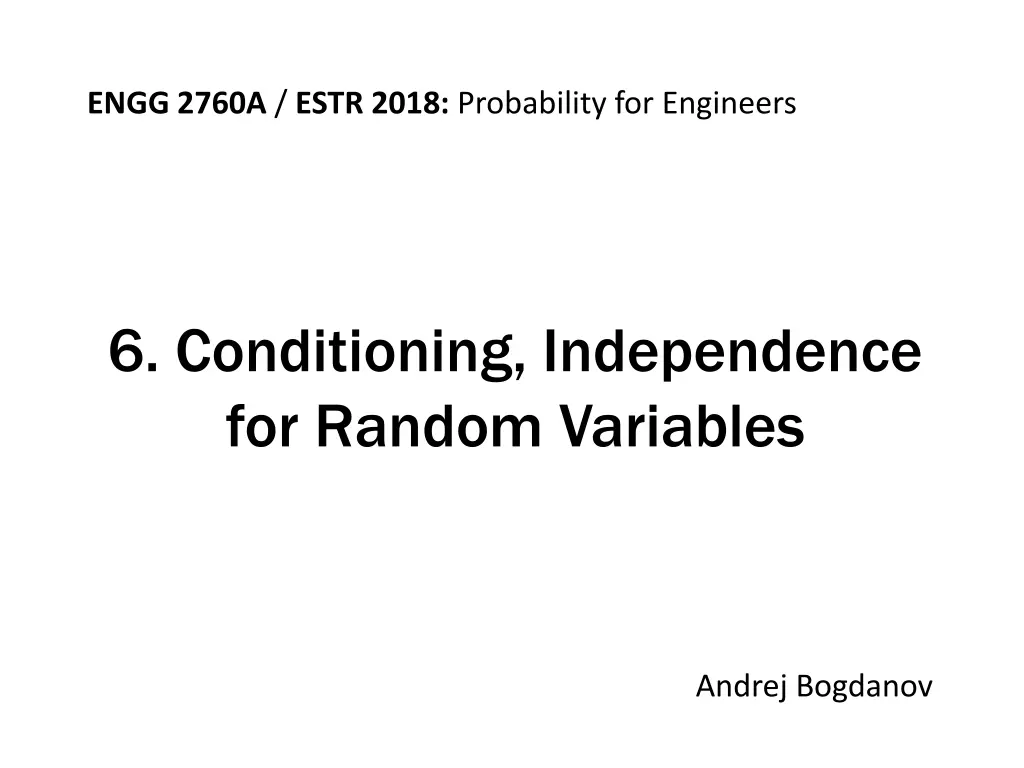
Probability Concepts in Engineering
Explore conditional probability, independence for random variables, and more in the context of engineering applications. Understand concepts like conditional PMF and conditional expectation through practical examples like dice rolls and coin flips.
Download Presentation

Please find below an Image/Link to download the presentation.
The content on the website is provided AS IS for your information and personal use only. It may not be sold, licensed, or shared on other websites without obtaining consent from the author. If you encounter any issues during the download, it is possible that the publisher has removed the file from their server.
You are allowed to download the files provided on this website for personal or commercial use, subject to the condition that they are used lawfully. All files are the property of their respective owners.
The content on the website is provided AS IS for your information and personal use only. It may not be sold, licensed, or shared on other websites without obtaining consent from the author.
E N D
Presentation Transcript
ENGG 2760A / ESTR 2018: Probability for Engineers 6. Conditioning, Independence for Random Variables Andrej Bogdanov
Conditional PMF Let X be a random variable and A be an event. The conditional PMF of X given A is P(X = x | A) =P(X = xandA) P(A)
What is the PMF of a 6-sided die roll given that the outcome is even?
You flip 3 coins. What is the PMF number of heads given that there is at least one?
Conditioning on a random variable The conditional PMF of X given Y is P(X = xandY = y) P(Y = y ) P(X = x | Y = y ) = pXY(x, y) pY(y) pX|Y(x | y) = For fixed y, pX|Y is a PMF as a function of x.
Roll two 3-sided dice. What is the PMF of the sum given the first roll?
Roll two 3-sided dice. What is the PMF of the first roll given the sum?
Conditional Expectation The conditional expectation of X given event A is E[X | A] = xxP(X = x | A) The conditional expectation of X given Y = y is E[X | Y = y] = xxP(X = x | Y = y)
You flip 3 coins. What is the expected number of heads given that there is at least one?
Total Expectation Theorem E[X] = E[X|A] P(A) + E[X|Ac] P(Ac) Proof
Total Expectation Theorem (general form) A4 A1 A3 If A1, , An partition then A5 A2 E[X] = E[X|A1]P(A1) + + E[X|An]P(An) In particular E[X] = yE[X|Y = y] P(Y = y)
type average time on facebook 30 min 60 min 10 min % of visitors 60% 30% 10% average visitor time =
You flip 3 coins. What is the expected number of heads given that there is at least one?
Mean of the Geometric X = Geometric(p) random variable E[X] =
Variance of the Geometric X = Geometric(p) random variable Var[X] = Proof (optional):
Geometric(0.5) Geometric(0.7) Geometric(0.05)
Independence Let Xbe a discrete random variable, A an event. X and A are independent if P(X = x, A) = P(X = x) P(A) for all possible values of x.
Let X, Y = face values of two 4-sided dice E= X + Yis even . Are X and E independent? What if the dice are 3-sided?
Independent random variables Let Xand Y be discrete random variables. X and Y are independent if P(X = x, Y = y) = P(X = x) P(Y = y) for all possible values of x and y. In PMF notation, pXY(x, y) = pX(x) pY(y) for all x, y.
Independent random variables X and Y are independent if P(X = x | Y = y) = P(X = x) for all x and y such that P(Y = y) > 0. In PMF notation, pX|Y(x | y) = pX(x) if pY(y) > 0.
Let X, Y = face values of two 4-sided dice Are X and Y independent? How about MAX = max{X, Y} and MIN = min{X, Y}?
Expectation and independence Xand Y are independent if and only if E[f(X)g(Y)] = E[f(X)]E[g(Y)] for all functions f and g. If Xand Y are independent then E[XY] = E[X]E[Y]
1 2 3 E[XY] = ? without replacement with replacement
Variance of a sum Recall Var[X] = E[(X E[X])2]= E[X2] E[X]2 Var[X + Y] =
1 2 3 Var[X + Y] = ? without replacement with replacement
Variance of a sum Var[X1+ + Xn] = Var[X1]+ + Var[Xn] if every pair Xi, Xj is independent.
What is the expected number of coin flips until you collect 10 heads? What is the variance?
n = 1 n = 10 p = 0.35 n = 100 n = 1000
